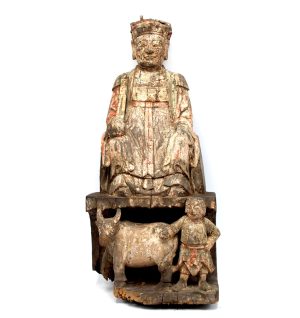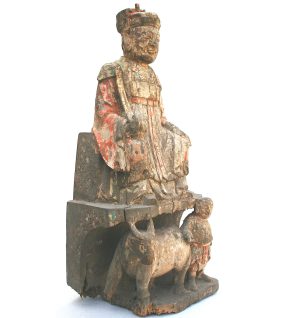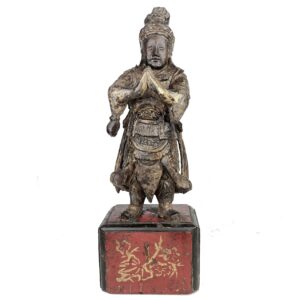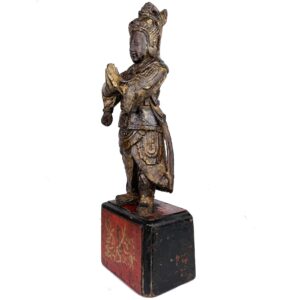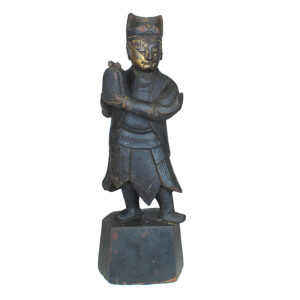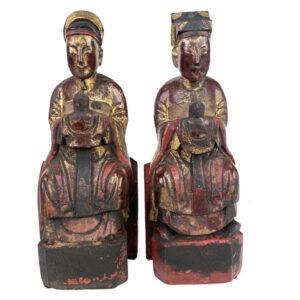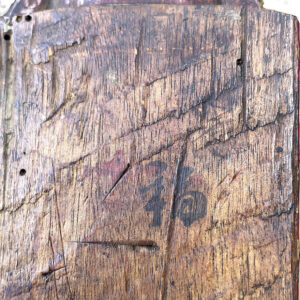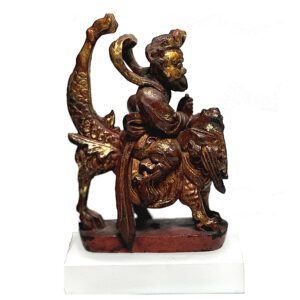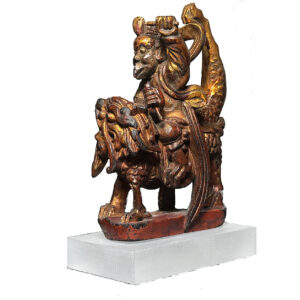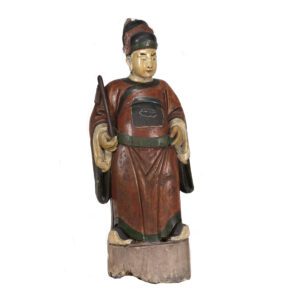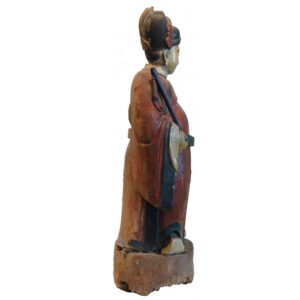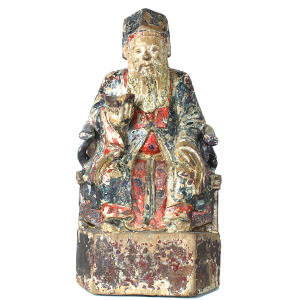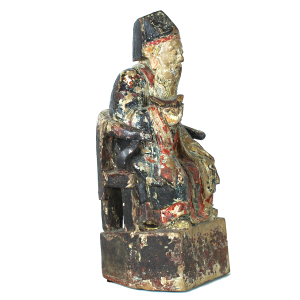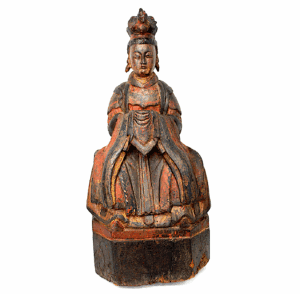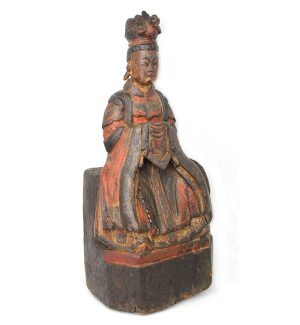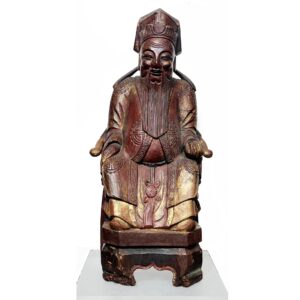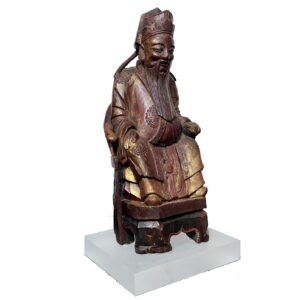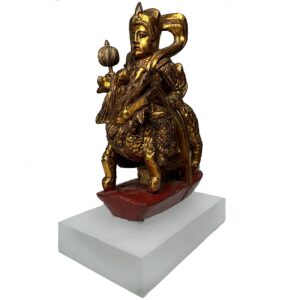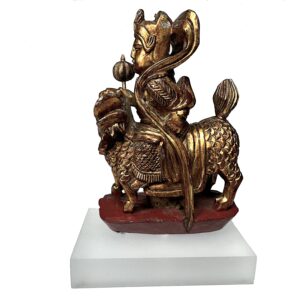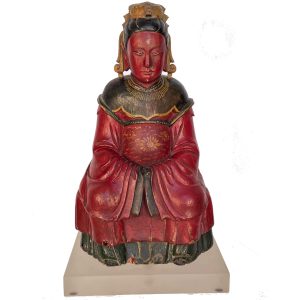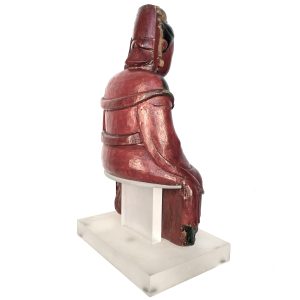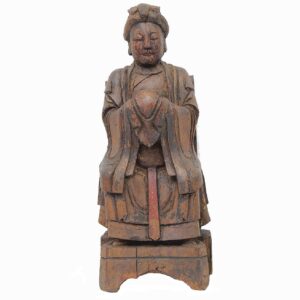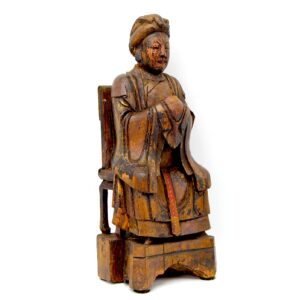Showing 1–12 of 30 results
-
Sale!


$885.00 Original price was: $885.00.$650.00Current price is: $650.00.
H: 14.25″ W: 7.125″ D: 4.8″ | FREE SHIPPING WITHIN CONTINENTAL U.S.
Extremely rare provincial carving with a Taoist official on top above the legendary “Spring Ox,” accompanied by the Taoist Earth God “Herd Boy” who each spring ritually “wakes up the earth” by symbolically beating the Spring Ox with sticks.
-
Sale!


$695.00 Original price was: $695.00.$395.00Current price is: $395.00.
H: 16.25: W: 5.875” D: 3.5” | FOR SHIPPING INFORMATION CONTACT US AT 213-568-3030
Attendant Chou Ts’ang, to Guandi, most revered Chinese military hero and Taoist God of War, hands clasped and eyes down in respect wearing detailed military clothing and boots on high pedestal with painted gold florals.
-
Sale!


$435.00 Original price was: $435.00.$365.00Current price is: $365.00.
H: 15.5″. W: 5.5″. D: 4.24″ | FREE SHIPPING WITHIN CONTINENTAL U.S.
Taoist attendant holding an offerings tied with ribbons that symbolized longevity for generations. Some gilt and lacquer has naturally darkened from years age and incense.
-
Sale!


$850.00 Original price was: $850.00.$650.00Current price is: $650.00.
H: 7.5″ W: 2.875″ D: 2″ | FREE SHIPPING WITHIN CONTINENTAL U.S.
VA’s most unique and finely crafted Kitchen God couple. Beautifully carved, clasping hu tablets, approachable features, smiling lips. Painted character on base wish for “happiness.” Add positive chi, enhance feng-shui.Unique house warming/wedding gifts.
-
Sale!


$350.00 Original price was: $350.00.$275.00Current price is: $275.00.
H: 6″ W: 2.5″ D: 4″ | FREE SHIPPING within continental US.
Miniature Taoist Thunder God who protects from injustice and punishes evildoers with his drum, mallet, chisel. Has bird’s beak and claws and dragon’s wings, rides a mythical hou. Part of bed frame carving with many protective deities.
-
Sale!


$4,800.00 Original price was: $4,800.00.$3,750.00Current price is: $3,750.00.
H: 32″ W: 9″ D: 8″ | CALL 213-568-3030 OR EMAIL [email protected] FOR SHIPPING
Lu Donghin, most celebrated of 8 Taoist Chinese Immortals, rides on clouds with a 2-edged sword to cut through greed, lust, sorrow. Venerated in temples, grottoes, sacred mountains, he is associated with medicine, elixir of life and power over evil spirits. This 18th large figure with cloud design on chest.
-
Sale!


$775.00 Original price was: $775.00.$495.00Current price is: $495.00.
H: 12.125″ W: 6.125″ D: 4.125a” | FREE SHIPPING WITHIN CONTINENTAL U.S.
Tudi Gong in horseshoe chair with typical kindly face, flowing beard, officials-attire: high hat, double waist belt, red color, holding a tael gold bar as wish for wealth. Most popular rural deity who protects small towns, residents and agriculture.
-
Sale!


$1,550.00 Original price was: $1,550.00.$985.00Current price is: $985.00.
H: 17.25″ W: 8″ D: 6″ CALL 213-568-3030 OR EMAIL [email protected] FOR SHIPPING.
Exquisite carved Queen Mother of the West, elaborate phoenix in crown. Most significant Taoist female deity, patron of women, divine teacher, determines length of people’s lives, associated with virtue and peaches of immortality.
-
Sale!


$745.00 Original price was: $745.00.$595.00Current price is: $595.00.
H: 10.25” W: 4.75” D: 3.625” | FREE SHIPPING WITHin Continental U.S.
Taoist God of Wealth (Caishen) portrayed as benevolent authoritative figure associated with wealth: holds tael, robe with coin decorations, painted with red and gold.
-
Sale!


$350.00 Original price was: $350.00.$275.00Current price is: $275.00.
H: 6″ W: 2.5″ D: 4″ | FREE SHIPPING WITHIN CONTINENTAL U.S.
Guan Ti, Chinese God of War and Justice dressed in military armor, officials cap with feathered wings and celestial scarf. Seated on mythical Hǒu . Along with Antique Thunder God Leigong on a Hou 16327. was part of bed carving to protect occupants.
-
Sale!


$1,750.00 Original price was: $1,750.00.$1,150.00Current price is: $1,150.00.
H: 21” W: 11.5” D: 8” | FOR SHIPPING call 213-568-3030 or email [email protected]
Temples for “Heavenly Empress” Mazu in southern China coastal regions protect sea faring peoples. This motherly home altar statue reflects that although childless, she protects her children – her devotees – as a mother. Seated on lucite base.
-
Sale!


$450.00 Original price was: $450.00.$395.00Current price is: $395.00.
H: 9” W: 6.525” D: 2.5 | FREE SHIPPING WITHIN CONTINENTAL U.S.
Small consecrated home altar provincial Mazu, finely carved on armless back chair dressed modestly in peasant robes with a phoenix in her hat, she is motherly figure who protects her devotees as her children.
End of content
End of content

